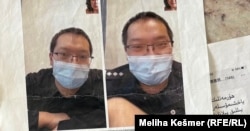Qalbinur Sidiq worked in one of the notorious mass detention camps for Uyghurs and other Muslim minorities spread across China’s western province of Xinjiang.
The Chinese language teacher says she was coerced into giving lessons in two camps, where she said detainees were subjected to torture, humiliation, and forced birth control.
After working in the camps for around nine months in 2017, Sidiq, too, was forcibly sterilized. The harrowing experience led her to move to the Netherlands in 2019.
“I begged not to be taken for surgery,” the 55-year-old told RFE/RL’s Balkan Service.
“I told them that I would not and could not have any more children. But I was still sterilized.”
Over 1 million Muslims -- Uyghurs and ethnic Kazakhs, Kyrgyz, Tajiks, and Uzbeks -- are believed to have disappeared into China’s vast network of high-security prison camps in Xinjiang in the past eight years.
Beijing claims the facilities are vocational reeducation centers for combating religious extremism. But activists, rights groups, and former detainees have shared accounts of rape, unwanted abortions, and forced labor in the camps.
Some rights groups and Western parliaments have accused China of committing genocide in the region, a claim Beijing rejects.
'I Would Hear Screams'
Sidiq, an ethnic Uzbek, was teaching at an elementary school in Urumqi, the capital of Xinjiang, when she was summoned by the authorities in February 2017.
She was then forced to accept a new job: teaching Chinese at an all-male internment camp. Sidiq was sworn to secrecy, and a police officer drove her to and from her new workplace.
“People were tied up and forced to crawl to get into the ‘classrooms,’” she told RFE/RL's Balkan Service at an event in Sarajevo. “They suffered in every way. Sometimes I would hear screams and cries for help from other rooms.”
Sidiq said all the detainees were Uyghurs, a Turkic-speaking ethnic minority in northwestern China. Xinjiang was the scene of a low-level separatist insurgency before a brutal state crackdown.
The detainees “were not just religious scholars, but people from all walks of life: academics, businessmen, philanthropists, doctors, and even those who had studied abroad,” said Sidiq, contradicting the authorities’ claim that the camps were designed to educate the “illiterate.”
“These people had no need for further education -- most of them were highly educated. Their only 'crime' was that they were Uyghurs.”
In the camps, detainees are taught intensive Chinese, forced to sing patriotic Chinese songs, and shown propaganda videos about the policies of the Chinese Communist Party. Most of them live in cells.
Forced Sterilization
After six months, Sidiq was transferred to an all-women camp, where she witnessed forced birth control.
“They were all forcibly sterilized,” she said. “They were given unknown pills that stopped their periods. Even girls who were not married were forcibly sterilized.”
One young woman, Sidiq remembers, was carried away in a stretcher and later died.
“She was 19 at most,” she said. “I think it was from all the pills they had to take. Her body just couldn't take it anymore.”
Sidiq herself was fitted with an intrauterine device to prevent her from getting pregnant, even though she was 47 years old.
The IUD caused heavy bleeding, and she was in constant pain. As Sidiq became ill, she was forced into early retirement and underwent sterilization.
“They ended up sterilizing me,” she said. “I wasn't forced to take pills like the others, but they operated on me.”
Leaving China
Chinese authorities have made it almost impossible for Uyghurs and members of other Muslim minorities to leave the country.
But Sidiq managed to move to Europe after overcoming bureaucratic red tape and obstacles.
Sidiq’s daughter, who lives in the Netherlands, sent her mother an invitation letter to come to Europe. Sidiq was able to secure a passport, a process that took some nine months. Her husband, an Uyghur, was barred from leaving the country.
“The most important thing was that I’m [ethnic] Uzbek,” she said. “If I were Uyghur, I would never have come out.”
Sidiq received asylum after arriving in the Netherlands in 2019. She has spoken out against the repression of Uyghurs and other Muslim minorities in China, making her a target for Beijing.
Chinese police contacted Sidiq and threatened her husband.
“They told me, ‘Don't do this. If you listen to us, we will help your husband get out of the country, or you can come back, and you will be together again.’”
But she refused. “Do whatever you want. I will not remain silent. That's what I said.”
Sidiq said her husband was forced to divorce her, and that she now has no contact with him.










